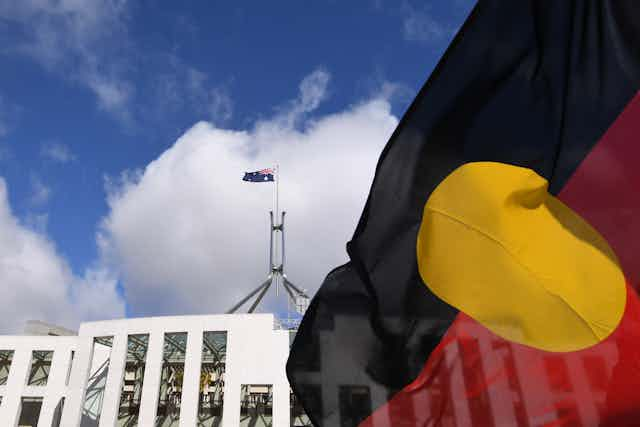Bigali Hanlon is a Yindjibarndi woman born in 1940 at Mulga Downs in Western Australia. At the age of six, she was taken from her mother and sent to live in a church-run hostel for “fair-skinned” indigenous children. She lived there until she was 13, when she went into indentured domestic service. As in many other cases, wages were paid – but never to Bigali.
She is one of thousands of people who sought compensation for the work they did under the oppressive institutionalised dispossessions enacted by the white colonial administration in Australia from 1890s right up until the 1970s.
The Western Australian government announced in 2010 that indigenous people would be compensated for unpaid wages, if they could provide documentary evidence to support their claim. Bigali duly submitted an application to access her government files so that she could lodge a claim with the Western Australian Stolen Wages Commission.
Bigali had to fight to get the government to release her files. On making her application, she says she was told that it would be too upsetting for her to read the material documenting her own life. She insisted many times that they be handed over to her – as she put it, “it was my pain to feel”, and they finally were. Bigali then made her files available to the stolen wages project at the University of Sydney through her granddaughter Talila Milroy, on the condition that her story would be shared more widely.
The files
Three large folders document Bigali’s life until she left care at 16. The detail of the records in Bigali’s files testifies to how Aboriginal people were treated by the government. Their every move was monitored and regulated.
Bigali, like thousands of other indigenous children, was removed from her family and placed in state care. There, she was taught proper “civilized ways” under the protection of an Aboriginal Welfare Board. Bigali herself was taken to live at Sister Kate’s Children’s Home at Queen’s Park, over 1,500 kilometres from her birthplace. As she has put it: “They [the protectors] take you away from your family, your community, your language, your culture – it’s genocide.”
The Australian Human Rights and Equality Opportunity Commission estimates that between 10% and 30% of Aboriginal children were removed from their families from 1910 to 1970.

It’s well understood that a desire for “racial purity” on the part of state and federal governments was behind these removals. But these stolen children also formed a pool of cheap (often unpaid) labour. Aboriginal girls could be trained according to white norms of housekeeping and mothering, providing a cheap source of reliable domestic labour along the way.
State governments enforced “protection acts” between 1890 and 1985. These acts gave extensive powers to protection boards to regulate every aspect of Indigenous people’s lives, including where they worked and lived, and who they married. Protectors, employed by the boards, were also responsible for the removal of children from their families, institutionalising them and sending them out in their early teens to work as domestic servants, farm hands and labourers. The acts legislated that wages for this work were to be held in trust by the protector, who then provided a small amount of pocket money to the worker. Many Aboriginal people, including Bigali, were never paid the money in their trust account. Workers were also denied entitlements such as maternity benefits and pensions.
Making amends?
In October 2006, the federal government held an inquiry into stolen wages. It concluded that state governments must allow better access to archives, fund education campaigns and provide legal research to support claimants in seeking compensation for wages or benefits never paid. Stolen wages commissions were set up in four states: Western Australia, Queensland, Victoria and New South Wales.
But Bigali and the other claimants were required to support their cases with a verifiable story. The documents that the government tried to deny Bigali access to contained the evidence she needed to prove to that same government that she had been stolen, where she had worked and for how long.
The irony was Bigali had been disconnected from her past and stripped of her identity several times over. Now she was being asked to prove who she was to the very governmental regime that had done this to her.
The commissions were effectively replicating the historical injustices associated with categorising and classifying people, separating them off from their families and communities, alienating them from their land, ways of life and language. All this while promising to compensate them for these injustices. Many claims were rejected because of a lack of documentation.
Bigali’s claim for compensation, while only partly covering all the wages she was owed, was successful. Through her own endeavours Bigali is now reunited with her family, and is a respected elder within the Yindjibarndi community.
Returning her stolen wages will not get back the years that she and her family, and so many others like them, have lost. Repayment will not enable Bigali to live the life she might have had in her own community, speaking her own language. It will not compensate for the sexual abuse and exploitation to which many stolen children were subject. But it is a step in that direction, and an important one. It provides some degree of recompense, recognising what has been done to Indigenous people and their families, communities and ways of life. But it is the start of a long and painful process, not the end of one.
Awareness of life stories such as Bigali’s ought to extend well beyond Western Australia. Otherwise we risk slipping into the idea that the pain caused is somehow historical. Calling on stolen children to account for themselves and their exploitation is no way to atone for their suffering.

